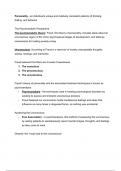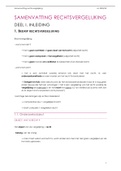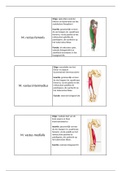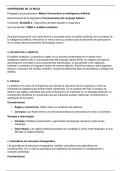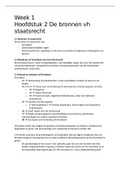Personality - an individual’s unique and relatively consistent patterns of thinking,
feeling, and behavior
The Psychoanalytic Perspective
The psychoanalytic theory: Freud, first theory of personality; includes ideas about an
unconscious region of the mind, psychosexual stages of development, and defense
mechanisms for holding anxiety at bay
Unconscious: According to Freud is a reservoir of mostly unacceptable thoughts,
wishes, feelings, and memories
Freud believed that there are 3 levels of awareness
1. The conscious
2. The preconscious
3. The unconscious
Freud’s theory of personality and the associated treatment techniques is known as
psychoanalysis
- Psychoanalysis - the techniques used in treating psychological disorders by
seeking to expose and interpret unconscious tensions
- Freud believed our unconscious holds troublesome feelings and ideas that
influence us many times in disguised forms, so nothing was accidental
Assessing the Unconscious
- Free Association - in psychoanalysis, this method of assessing the unconscious
by asking patients to spontaneously report mental images, thoughts, and feelings
as they come to mind
Dreams: the “royal road to the unconscious”
, - Freud referred to the remembered content of dreams as their manifest content,
which he believed to be a censored expression of the dreamer’s unconscious
wishes
- Freud referred to the disguised, symbolic meaning of dreams as the latent
content
Freud proposed 3 interacting systems that make up the personality: id, ego, and
superego
- id: the pleasure principle that wants immediate gratification
- Lacks impulse control
- Choosing to go to a party in
- Increases likelihood of being pregnant / substance abuse
- The unconscious constantly striving to satisfy basic drives and operates
on the pleasure principle and demands immediate gratification
- Ego: the reality principle ; balances between id and superego
- Operates on the reality principle, seeks to gratify the id’s impulses in
realistic ways ; the “executive” part of personality
- Superego: the strive to be perfect
- Beats self up over imperfections
- Increased likelihood of substance abuse
- The voice of our conscience, focuses on how one ought to behave ;
strives for perfection and produces feelings of pride or guilt
Psychosexual stages: the childhood stages of development during which the id’s
pleasure-seeking energies focus on distinct erogenous zones
- Oral: 0-18m
- Focus on oral stimulation
- Toys in mouth, chewing things
- Anal: 18-36m
- Focus on potty training and control
- Potty training
feeling, and behavior
The Psychoanalytic Perspective
The psychoanalytic theory: Freud, first theory of personality; includes ideas about an
unconscious region of the mind, psychosexual stages of development, and defense
mechanisms for holding anxiety at bay
Unconscious: According to Freud is a reservoir of mostly unacceptable thoughts,
wishes, feelings, and memories
Freud believed that there are 3 levels of awareness
1. The conscious
2. The preconscious
3. The unconscious
Freud’s theory of personality and the associated treatment techniques is known as
psychoanalysis
- Psychoanalysis - the techniques used in treating psychological disorders by
seeking to expose and interpret unconscious tensions
- Freud believed our unconscious holds troublesome feelings and ideas that
influence us many times in disguised forms, so nothing was accidental
Assessing the Unconscious
- Free Association - in psychoanalysis, this method of assessing the unconscious
by asking patients to spontaneously report mental images, thoughts, and feelings
as they come to mind
Dreams: the “royal road to the unconscious”
, - Freud referred to the remembered content of dreams as their manifest content,
which he believed to be a censored expression of the dreamer’s unconscious
wishes
- Freud referred to the disguised, symbolic meaning of dreams as the latent
content
Freud proposed 3 interacting systems that make up the personality: id, ego, and
superego
- id: the pleasure principle that wants immediate gratification
- Lacks impulse control
- Choosing to go to a party in
- Increases likelihood of being pregnant / substance abuse
- The unconscious constantly striving to satisfy basic drives and operates
on the pleasure principle and demands immediate gratification
- Ego: the reality principle ; balances between id and superego
- Operates on the reality principle, seeks to gratify the id’s impulses in
realistic ways ; the “executive” part of personality
- Superego: the strive to be perfect
- Beats self up over imperfections
- Increased likelihood of substance abuse
- The voice of our conscience, focuses on how one ought to behave ;
strives for perfection and produces feelings of pride or guilt
Psychosexual stages: the childhood stages of development during which the id’s
pleasure-seeking energies focus on distinct erogenous zones
- Oral: 0-18m
- Focus on oral stimulation
- Toys in mouth, chewing things
- Anal: 18-36m
- Focus on potty training and control
- Potty training

